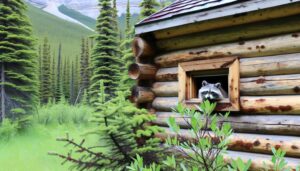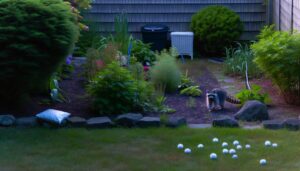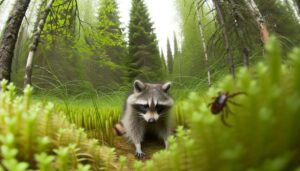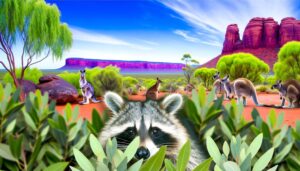Legal Facts About Pet Raccoons in Canada
In Canada, the legality of keeping pet raccoons varies by province and is strictly regulated. Federal laws under CITES and the Health of Animals Act set the overarching framework, but provincial jurisdictions have specific requirements for permits and ownership criteria.
Ontario and Quebec implement stringent regulations, requiring permits for possession, while Alberta generally forbids private ownership without a specialized permit. Violations can lead to substantial fines, legal action, and confiscation of the animal.
Each province has distinct wildlife policies affecting ownership, so understanding these regulations is essential for compliance. Learn more about the specific provincial and local regulations governing raccoon ownership.
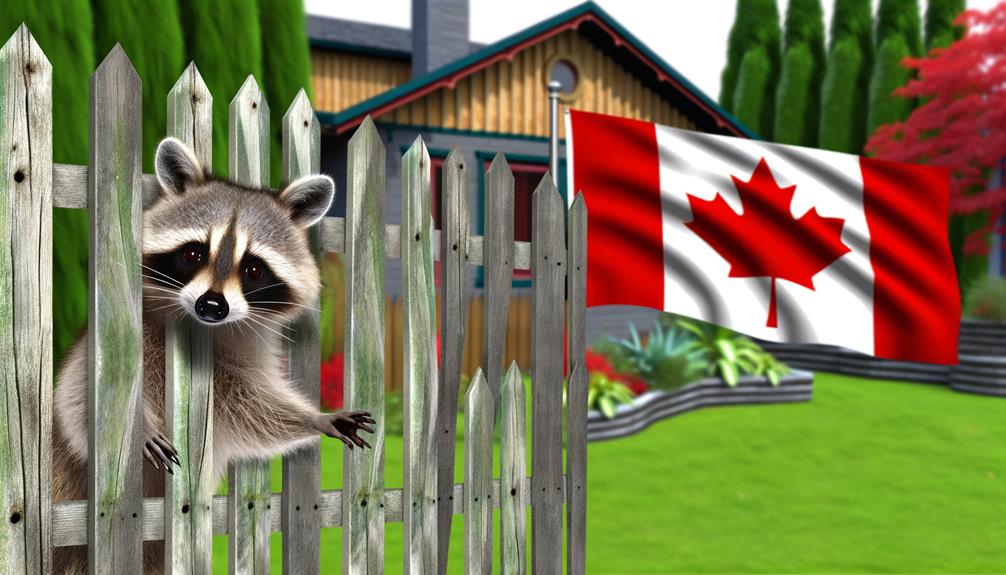
Key Takeaways
- Pet raccoon ownership in Canada is regulated by federal, provincial, and local laws.
- Ontario and Quebec require permits for pet raccoon ownership.
- Alberta generally prohibits private raccoon ownership without specific permits.
- Raccoons are classified under the Controlled Alien Species Regulation.
- Illegal raccoon ownership can result in significant fines and legal penalties.
Federal Laws on Exotic Pets
What specific federal laws govern the ownership of exotic pets, including raccoons, in Canada?
The federal jurisdiction over exotic pet ownership in Canada is primarily managed through the Convention on International Trade in Endangered Species of Wild Fauna and Flora (CITES), which Canada is a signatory to. Administered by Environment and Climate Change Canada, CITES regulates the import, export, and possession of species listed under its appendices.
While raccoons are not listed under CITES, other exotic animals may be. Additionally, the Health of Animals Act, overseen by the Canadian Food Inspection Agency (CFIA), ensures that exotic pets do not pose a risk to native wildlife or agricultural sectors.
These federal laws establish a regulatory framework, although oversight is often delegated to provincial and local authorities.
Provincial Regulations Overview
Provincial regulations on pet raccoons in Canada exhibit significant variability, reflecting distinct wildlife policies and legislative frameworks.
These regulations encompass specific requirements for exotic pet permits, which are pivotal for ensuring both public safety and animal welfare.
Understanding these provincial distinctions is vital for prospective raccoon owners to comply with local laws and maintain responsible pet ownership.
Provincial Wildlife Policies
Each Canadian province enforces distinct wildlife regulations that govern the ownership, care, and housing of pet raccoons. These regulations are essential for guaranteeing the well-being of both the animals and the community.
Key aspects of provincial wildlife policies include:
- Ownership Restrictions: Certain provinces prohibit the ownership of raccoons entirely, while others allow it under specific conditions.
- Housing Standards: Provinces may mandate specific enclosure standards to secure raccoons are kept in environments that meet their physical and psychological needs.
- Health and Safety Protocols: Vaccination requirements and health checks are often stipulated to prevent the transmission of diseases between raccoons and humans.
Understanding these regulations is vital for potential raccoon owners committed to responsible pet ownership and community safety.
Exotic Pet Permits
Securing an exotic pet permit in Canada involves navigating an intricate network of provincial regulations. Each province has tailored rules to address the unique ecological and safety concerns associated with keeping raccoons as pets. Provincial statutes vary significantly. For example, British Columbia and Ontario impose stringent conditions. These often require detailed documentation, including habitat plans and veterinary care schedules.
In contrast, provinces like Alberta and Saskatchewan may have more lenient guidelines. However, they still demand adherence to specific health and safety standards. Prospective raccoon owners must navigate these regulatory landscapes meticulously. They must ensure compliance with all legal prerequisites. This often involves engaging with wildlife authorities, securing necessary endorsements, and undergoing periodic inspections to verify the welfare of the animal and its impact on local ecosystems.
Raccoon Ownership in Ontario
Raccoon ownership in Ontario is governed by stringent provincial wildlife regulations aimed at guaranteeing both public safety and the welfare of the animals.
Legal permit requirements are strictly enforced, mandating that prospective raccoon owners obtain the necessary authorizations from relevant authorities.
Compliance with these regulations is essential to avoid substantial penalties and guarantee responsible pet ownership.
Provincial Wildlife Regulations
In Ontario, the ownership of raccoons is strictly regulated under provincial wildlife laws to ensure the protection of both the animals and the public. The Ontario Ministry of Natural Resources and Forestry (MNRF) enforces these regulations, ensuring that raccoons are managed responsibly.
Key considerations include:
- Wildlife Classification: Raccoons are classified as native wildlife, making them subject to specific regulatory measures to prevent their capture and domestication.
- Public Safety: Regulations are designed to mitigate the risk of zoonotic diseases, such as rabies, which raccoons can carry.
- Animal Welfare: Ensuring raccoons' natural behaviors and habitats are preserved is paramount, emphasizing that these animals are not suited for domestic environments.
Understanding these regulations is essential for anyone considering raccoon ownership.
Legal Permit Requirements
To legally own a raccoon in Ontario, individuals must obtain a specific permit issued by the Ontario Ministry of Natural Resources and Forestry (MNRF). This permit guarantees compliance with the Fish and Wildlife Conservation Act, which regulates the possession of native wildlife. Applicants must provide detailed information about their facilities, care protocols, and demonstrate adequate knowledge of raccoon behavior and welfare needs.
Additionally, the MNRF conducts inspections to verify that the living conditions meet stringent standards for safety and humane treatment. The permit application process also includes a review of the applicant's background to secure no history of animal welfare violations. These measures collectively aim to protect both the raccoons and the public, ensuring responsible ownership.
Quebec's Stance on Pet Raccoons
Quebec enforces stringent regulations regarding the ownership of pet raccoons, reflecting the province's commitment to wildlife conservation and public safety. Key aspects of these regulations include:
- Permit Requirements: Potential raccoon owners must obtain a special permit from the Ministère des Forêts, de la Faune et des Parcs (MFFP), ensuring adherence to strict criteria.
- Health and Safety Standards: Owners must demonstrate the ability to provide proper care, including adequate habitat, diet, and medical attention for the raccoon.
- Wildlife Protection Laws: Regulations prohibit capturing raccoons from the wild, emphasizing the protection of local ecosystems and species.
These measures underscore Quebec's dedication to balancing human interests with the ethical treatment of wildlife and the preservation of biodiversity.
Alberta and Raccoon Laws
Alberta's regulatory framework for the ownership of pet raccoons is characterized by stringent restrictions designed to protect both public safety and local wildlife. The province has designated raccoons as 'controlled animals' under the Wildlife Act, thereby prohibiting private individuals from keeping them as pets without specific permits. These permits are rarely issued, primarily reserved for educational or rehabilitation purposes.
Alberta's legislation reflects a commitment to preventing the potential transmission of diseases, such as rabies, and mitigating ecological impacts on native species. Enforcement is rigorous, with substantial penalties for non-compliance. By prioritizing both human and environmental health, Alberta exemplifies a prudent approach to exotic pet ownership, ensuring that public welfare and biodiversity remain safeguarded.
British Columbia's Exotic Pet Rules
British Columbia maintains a comprehensive regulatory framework for the ownership of exotic pets, including raccoons, designed to guarantee both public safety and ecological balance. The province's regulations are explicitly detailed and aimed at reducing risks associated with non-native species. Here are three key elements:
- Permitting System: Potential owners must acquire a permit, outlining housing, care standards, and containment measures.
- Species Classification: Raccoons are categorized under the Controlled Alien Species Regulation, necessitating strict compliance with provincial statutes.
- Inspection and Enforcement: Regular inspections ensure adherence to regulations, with enforcement actions taken against non-compliance.
These measures reflect British Columbia's dedication to safeguarding its ecosystems and communities while allowing controlled ownership of exotic pets.
Legal Consequences of Illegal Ownership
Despite stringent regulations in provinces like British Columbia, the illegal ownership of raccoons in Canada can lead to severe legal repercussions. Offenders may face significant fines, legal proceedings, and even imprisonment. Additionally, unauthorized possession of raccoons can result in the confiscation of the animal and potential bans on future pet ownership. Legal consequences vary by jurisdiction, with some provinces imposing stricter penalties than others. It is vital for individuals to be well-informed about their regional laws to avoid these punitive measures.
| Province | Fine Range ($CAD) | Additional Penalties |
|---|---|---|
| British Columbia | 500 – 5,000 | Confiscation |
| Ontario | 1,000 – 10,000 | Community Service |
| Quebec | 250 – 7,500 | Mandatory Education Program |
| Alberta | 1,500 – 20,000 | Bans on Future Pet Ownership |
| Nova Scotia | 500 – 8,000 | Probation |
Understanding these legal implications is essential for responsible pet ownership.
Conclusion
The legality of pet raccoons in Canada varies notably across federal, provincial, and territorial jurisdictions, each with distinct regulations and enforcement mechanisms.
For instance, in Ontario, owning a raccoon as a pet is prohibited, resulting in legal repercussions such as fines or confiscation. This regulatory landscape underscores the importance of thorough legal awareness for potential exotic pet owners to avoid unintended violations.
A hypothetical scenario: an Ontario resident faces penalties after authorities discover an illicit pet raccoon, exemplifying the stringent regulatory framework.

